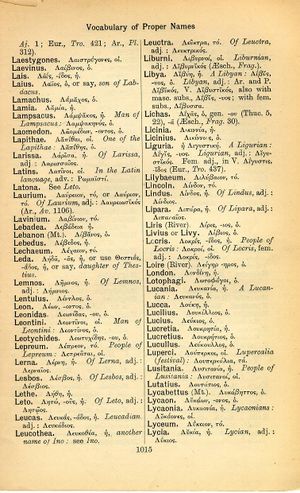Lais
γεγόναμεν γὰρ πρὸς συνεργίαν ὡς πόδες, ὡς χεῖρες, ὡς βλέφαρα, ὡς οἱ στοῖχοι τῶν ἄνω καὶ κάτω ὀδόντων. τὸ οὖν ἀντιπράσσειν ἀλλήλοις παρὰ φύσιν → we are all made for mutual assistance, as the feet, the hands, and the eyelids, as the rows of the upper and under teeth, from whence it follows that clashing and opposition is perfectly unnatural
English > Greek (Woodhouse)
Λαΐς, -ΐδος, ἡ.
Latin > English (Lewis & Short)
Lāïs: ĭdis and ĭdos, f., = Λας,
I the name of two courtesans of Corinth celebrated for their beauty.
I Lais, who flourished during the Peloponnesian war: dicitur et multis Lais amata viris, Ov. Am. 1, 5, 12; Cic. Fam. 9, 26, 2 (acc. Laida); Prop. 2, 6, 1 (gen. Laidos).—
II Lais, a contemporary of Demosthenes, Gell. 1, 8, 3 sqq.; Plin. 28, 7, 23, § 81.—Acc. plur.: Laidas et Glyceras, lascivae nomina famae, Aus. Epigr. 18, 1.

